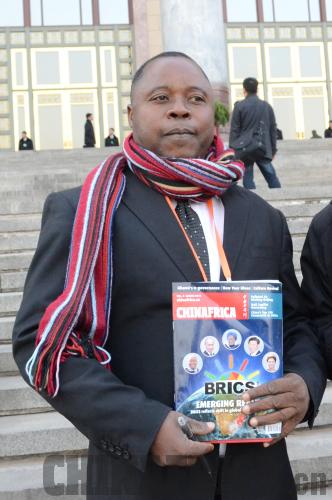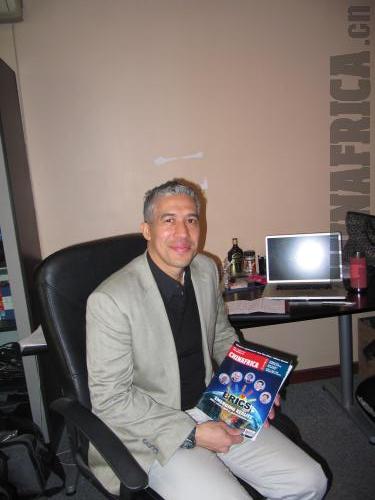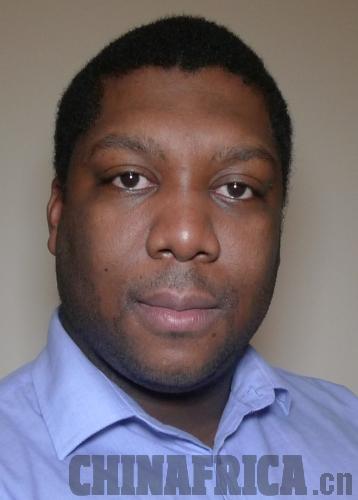| The expansion of China-Africa relations in recent years has led to a deepening of connections between the Chinese and African peoples. Important events in China and Africa are attracting a lot of interest from both sides. One of these events is the annual sessions of the National People’s Congress (NPC) and the Chinese People’s Political Consultative Conference (CPPCC), known as the “lianghui” in Chinese, which took place this year from March 3-17. As the lianghui received vast coverage in African media, especially after the election of China’s new leadership, ChinAfrica reporter Ni Yanshuo interviewed three journalists covering the lianghui in Beijing for African media to gauge their views on China and Sino-African relations.
 |
|
Dandong Asen Godfred (LIU JIAN) |
Dandong Asen Godfred
Reporter with Cameroon Radio and Television
I came to Beijing to cover the lianghui. I am not here as an individual, but as a representative of Cameroon Radio and Television, the largest television service in my country. Besides covering the lianghui, I am also here because of the cooperation between Cameroon, China and the whole of Africa.
China's presence in Africa is very important. The lianghui, an important political event in China, should be followed closely to understand how things are evolving in China. We report a lot about China. Cameroon Radio and Television always sends reporters to China to cover important events, be they political or economic.
Cameroonian President Paul Biya has a lot of connections with China in the areas of economic exchange, cooperation, business and foreign investment. Cameroon is currently engaged in reconstruction and transformation. This process of transformation involves a lot of activities that require funds from foreign investors. China is one of Cameroon's partners when it comes to investment and business.
Cameroonian people are interested in China. When two countries have good relations, their peoples are interested in each other. There are many Cameroonians coming to China to do business. This kind of cooperation is mutually beneficial for both countries. Chinese people are also interested in Cameroon as it offers a lot of opportunities for investment as Cameroon is undergoing great transformations. As a friend of China, Cameroon welcomes Chinese who want to invest in Cameroon. Cameroonians, too, would like to come [to China] to purchase goods and take them back home to sell.
I have stayed in Beijing for several days for the lianghui. It is very significant for a country to undergo leadership transitions. China is changing its leadership and we want to know what China has done so far, and what China intends to do in the future.
Cameroon is a good friend of China, just like China is a good friend of Cameroon. This friendship can boost development in both countries. Cameroon has a lot of raw materials, and is a country with a lot of economic potential.
I am optimistic about our countries' bilateral relations because I see that things are going well. When it comes to bilateral relations, you can only judge from what you see.
|

|
|
John Bailey (NI YANSHUO) |
John Bailey
Bureau Chief of ETV (South Africa) to China
I think it is very important to see how things are evolving in China.
Since the start of the lianghui this year, I have been closely watching the political event. I was impressed by Premier Wen Jiabao's government work report, which he delivered on March 5. I could see he was getting down to business. He put more emphasis on social welfare, looking after the people, and the fact that China does not push for development at all costs. He also stressed addressing pollution, particularly water and soil pollution, and fighting against corruption. These are very important for China's development.
This year's lianghui has been all about change. It has been more focused on education. The issue of reforming the hukou (household registration) system has also been raised. It has been made clear that education must be made available for the children of migrant workers who work in cities. That's important, especially as China becomes more organized. You can't have children be denied education in places where their parents work. It's not beneficial to the country.
The other major issue seems to be corruption. This topic is very important, especially because Xi Jinping has been talking about it since he became the general secretary of the CPC Central Committee [in November 2012].
The news I send back to South Africa is always relayed from the perspective of a developing country. China is a developing country, as is South Africa. We face the same kind of issues. South Africa also has a widening wealth gap, which is causing much anger in my country. A small group of people are getting very rich while the rest of the country is still poor. So, we need to find a way to bridge the gap. Corruption is another major issue in South Africa. We also have problems with education; more people should be educated in my country.
This year is the 15th anniversary of the establishment of diplomatic relations between our two countries, so our bilateral relationship is still very young. But it has grown very fast in the past 15 years. I think credit should go to the leaders. If you look at the engagement between the top leaders of the two countries, they seem to understand each other well. That is important for the continuation of deepening ties between the two countries. It is important to see a lot of engagement on the national leadership level, and that leaders meet not only in bilateral, but also in multilateral forums, such as the G20 and the UN Climate Change Conference. It's important that they keep on talking. That will hopefully improve the relationship and increase exchanges between the countries' peoples as well.
 |
|
Danny Vincent (COURTESY PHOTO) |
Danny Vincent
A British citizen working for Arise TV Nigeria (Arise is a pan-African TV station)
At Arise News, we are particularly interested in Chinese-African trade, so we have been very interested in the economic forecasts for 2013. We feel that China in many ways has already become a power, so we feel that what happens in China affects people all across the world including, of course, the African continent. As the Chinese economy is very important to the global recovery, we are all watching China very closely.
China will have new leaders after the lianghui. But as the Chinese Government seems to specialize in continuity, we are not really expecting a change in direction in terms of policy. But I imagine there will be further deepening of relations. China now has ties to many countries through the economy and also through education, but I think we would like to see an increase in cultural exchange. I think mutual understanding on an individual level between Chinese and Africans should also be addressed. I like to think that there are as many similarities as there are differences between Africans and the Chinese.
Arise has been focusing on social stories relating to China and Africa. Recently, we have been exploring the different attitudes toward China's involvement in the continent and the increase in the number of African students studying in China.
I think that Sino-African relations are deepening. But I think that the relationship is also misunderstood, which is understandable because it's complicated. If you ask a Chinese mine owner, a Western politician, and an African government official the same question about Sino-African relations, you are likely to get three totally different answers.
The West is still very suspicious of China's role in Africa. But I think young Africans have a different perspective on Sino-African relationships. I recently interviewed a young African entrepreneur called Norbert Haguma. He told me that until Africa starts producing cars, it will have to trade its resources because it can't trade with nothing. I think he has a point. I think those who invest time into understanding Africa will be well placed for the future. |